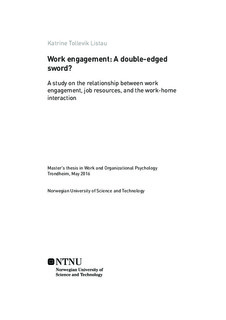| dc.description.abstract | The aim of this study was to investigate how being engaged at work affects employees’ workhome interaction (WHI). Few studies examining this relationship have included both the positive and negative aspects of the intercept between the work and home domain or
examined the individual subscales of engagement in relation to this interaction. Using the
Conservation of Resources theory as a theoretical framework, this study contributes to
existing research by examining the relationship between the work engagement subscales (i.e. vigor, dedication, and absorption) and both work-home facilitation (WHF) and work-home conflict (WHC). Furthermore, this study also examined the effects of job autonomy and social support from supervisor on these outcomes, in addition to whether they might moderate the relationship between engagement and the WHI. In order to test the hypotheses, a PLS-SEM analysis was conducted using a large sample of academics from the Norwegian university sector (n = 4378). The results indicated that vigor and dedication had a positive effect on work-home facilitation and a negative effect on work-home conflict. In contrast, absorption was not significantly related to WHF, but had a positive effect on WHC. Furthermore, both social support and autonomy had a positive effect on WHF and a negative effect on WHC.
However, the results also indicated that job autonomy may enhance the effect of absorption on both WHF and WHC. Job autonomy therefore seems to increase both positive and negative spillover effects between the work and home domains. | nb_NO |
